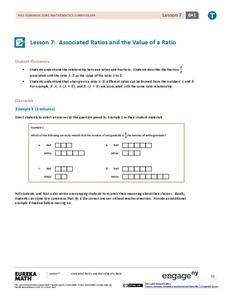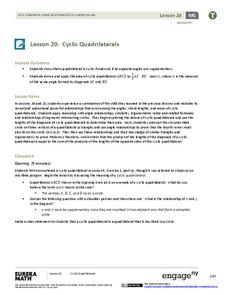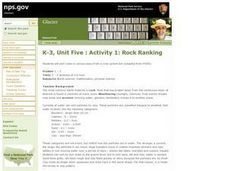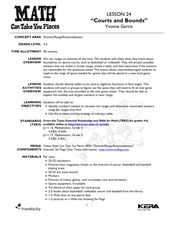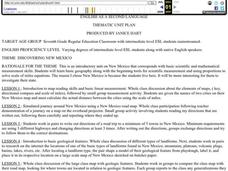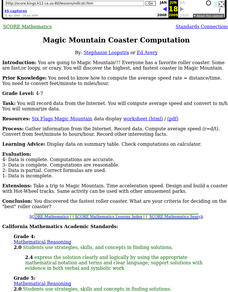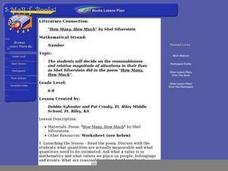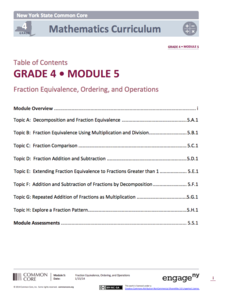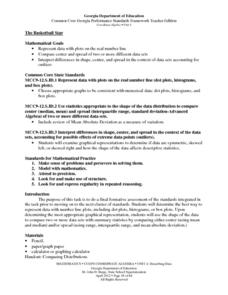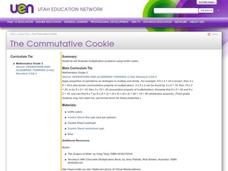EngageNY
Associated Ratios and the Value of a Ratio
Do ratios have values? The seventh lesson in a series of 29 introduces the value of a ratio. Pupils create associated ratios to a given ratio. They also describe the fraction associated to the ratio as the value of the ratio.
EngageNY
Definition of Rotation and Basic Properties
Examine the process of rotating images to visualize effects of changes to them. The fifth lesson of 18 prompts pupils to rotate different images to various degrees of rotation. It pays special attention to rotations in multiples of 90...
EngageNY
Numbers Raised to the Zeroth Power
What in the world is the zeroth power? Examine the patterns of exponents as they apply to the zeroth power. Scholars apply the zero property to simple exponential expressions in this fourth lesson in a series of 15. The examples include...
EngageNY
Using Permutations and Combinations to Compute Probabilities
Now that we know about permutations and combinations, we can finally solve probability problems. The fourth installment of a 21-part module has future mathematicians analyzing word problems to determine whether permutations or...
EngageNY
Sequencing Reflections and Translations
Don't get out of order! Examine the effect of order on a sequence of transformations. Learners perform reflections and translation transformations in sequence. They see that changing the order of the transformations does not always have...
EngageNY
Cyclic Quadrilaterals
What does it mean for a quadrilateral to be cyclic? Mathematicians first learn what it means for a quadrilateral to be cyclic. They then investigate angle measures and area in such a quadrilateral.
EngageNY
Unknown Angles
How do you solve an equation like trigonometry? Learners apply their understanding of trigonometric ratios to find unknown angles in right triangles. They learn the meaning of arcsine, arccosine, and arctangent. Problems include...
Virginia Department of Education
Lines and Angles
Explore angle relationships associated with transversals. Pupils construct parallel lines with a transversal and find the measures of the angles formed. They figure out how the different angles are related before constructing...
National Park Service
Rock Ranking
Junior geologists sort rocks and soil. They separate a sample of river gravel by size, shape, color, and other characteristics. To include Common Core standards, you could have little ones graph the number of particles in each sample.
Curated OER
Roman Numeral Math
Learners solve math problems using Roman numerals. In this roman numerals lesson, students use suggested websites to develop an understanding of Roman numerals and solve simple addition equations. Learners create a chart of Roman...
Curated OER
Estimating Solutions to Word Problems
Fourth graders explore number sense by completing word problems in class. In this estimation lesson, 4th graders define terms such as sum, difference, estimate and best. Students complete estimating worksheets based on the concept of...
Curated OER
Courts and Bounds
Students relate what they know about boundaries on sports courts to explore range of space. In this domain and range lesson, students identify numbers needed to calculate ranges and use the problem solving strategy of making a table.
Curated OER
Ordinal Positions in a Sequence
Students study ordinal positions through class reading and discussion, complete an Animal Parade activity sheet and Internet activity to demonstrate knowledge about ordinal positions with 100% accuracy, and play a math computer game.
Curated OER
Data Analysis Digital Display
Students create a survey online. In this math lesson, students graph survey data using flisti.com. They share and analyze their classmates' histogram.
Curated OER
Discovering New Mexico
Seventh graders discuss the elements of maps and using basic linear measurement. They calculate the distance between the cities and create a simulated journey around New Mexico using a road map. They write out the directions for their...
Curated OER
Problem-Solving Strategy: Find a Pattern: Problem-Solving
In this finding patterns worksheet, learners read the word problem about costume costs and study the graph. Students then follow the steps of understand, plan, solve, and look back to find the pattern.
Curated OER
Magic Mountain Coaster Computation
Students use the Internet to do research on the roller coasters at Magic Mountain Amusement Park. They must use mathematical formulas to calculate the highest and fastest coaster at the park.
Curated OER
Teaching of Addition
Learners add different objects together to find out how many objects there are total. They explain up to 3 different reasons why being able to add is important.
Curated OER
"How Many, How Much" by Shel Silverstein
Students decide on the reasonableness and relative magnitude of situations in their lives as Shel Silverstein did in the poem "How Many, How Much."
Curated OER
Estimation Using Goldfish Crackers: Math
Second graders explore estimation and rounding concepts using goldfish crackers and a song! They solve problems by estimating and rounding numbers and pick numbers within reason to represent certain objects.
Curated OER
Smarty pants puzzles
In this word problem worksheet, students view word problems that represent lemonade stands and state whether they are true, unknown, or false. Students view 2 different lemonade stand prices and values.
EngageNY
Fraction Equivalence, Ordering, and Operations
Need a unit to teach fractions to fourth graders? Look no further than this well-developed and thorough set of lessons that takes teachers through all steps of planning, implementing, and assessing their lessons. Divided into eight...
Georgia Department of Education
The Basketball Star
Have learners use math to prove they are sports stars! Assess a pupil's ability to create and analyze data using a variety of graphs. The class will be motivated by the association of math and basketball data.
Curated OER
The Commutative Cookie
Third graders investigate the commutative properties of multiplication and focus upon the setting of cubes in the correct patterns to solve problems. They differentiate between numbers that have multiple factors and prime numbers....


